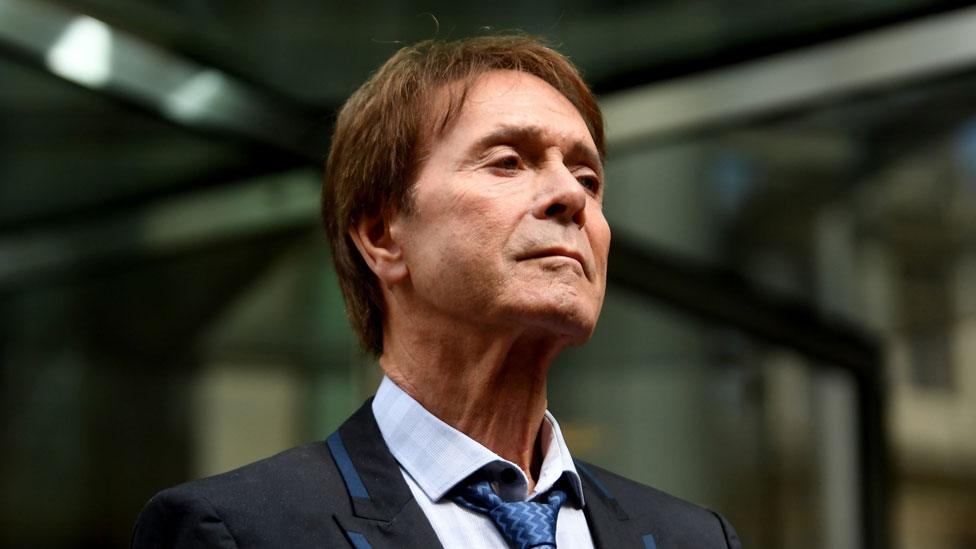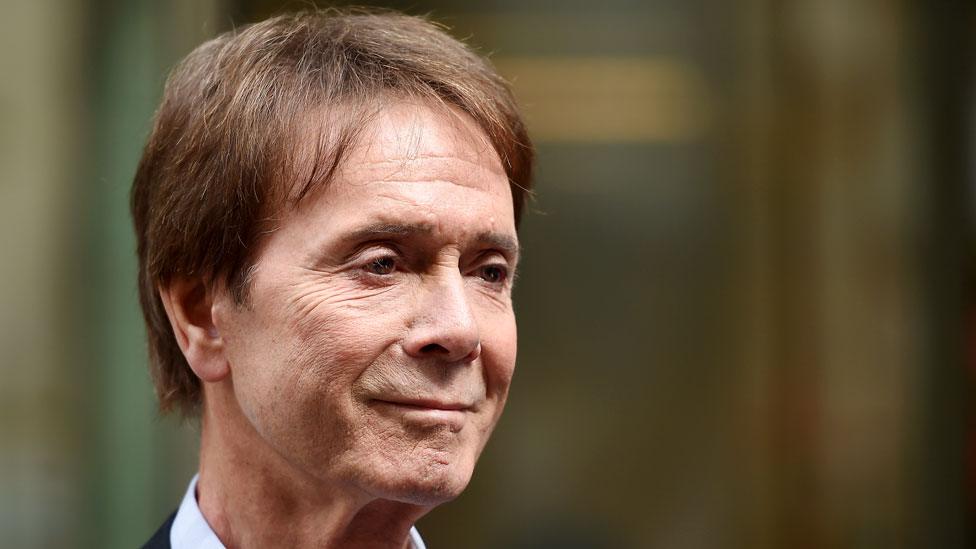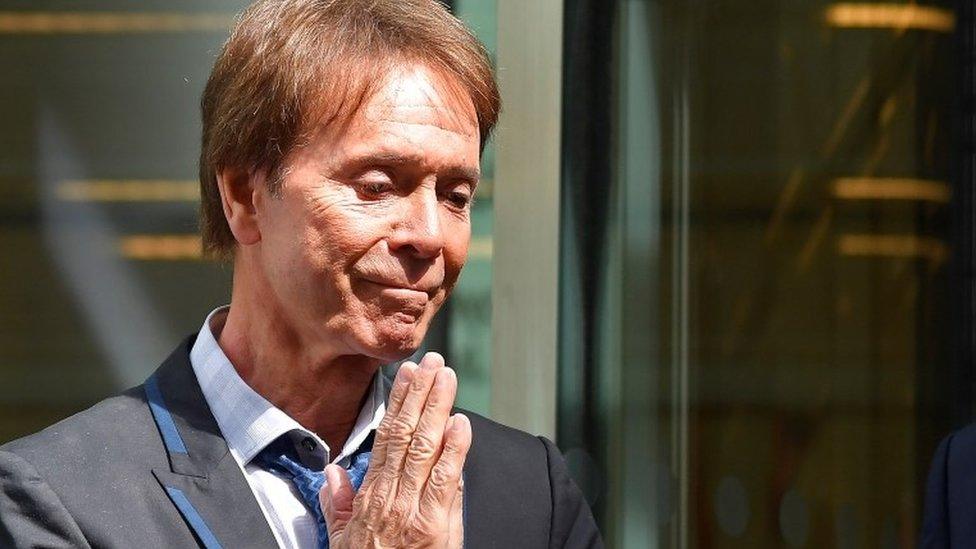Sir Cliff Richard privacy case: BBC will not go to Court of Appeal
- Published

The BBC will not challenge a ruling over its coverage of a police raid at Sir Cliff Richard's home in 2014 at the Court of Appeal.
A High Court judge ruled the BBC had infringed the singer's privacy, awarding him £210,000 in damages in July, and refused leave to appeal.
The corporation will now seek advice from the attorney general over the ruling's impact on future reporting.
"There is a fundamental principle of press freedom at stake," the BBC said.
A spokesperson for Sir Cliff said he welcomed the BBC's decision, adding that he "hopes that outstanding issues can be resolved quickly".
David Jordan, the BBC's director of editorial policy and standards, said the full cost of the case to the BBC was not yet known, but £1.9m had so far been spent.
Sir Cliff was never arrested or charged during the police investigation.
It followed an allegation made by a man who claimed he was sexually assaulted as a child by Sir Cliff at an event at Sheffield United's Bramall Lane stadium in 1985.
The BBC has apologised to Sir Cliff for the distress caused by its coverage, but originally wanted permission to appeal, arguing the court judgement could threaten press freedom.
After considering the rejection of its High Court appeal application, the broadcaster has decided not to go directly to the Court of Appeal.
The BBC said appealing would be "an expensive legal cul-de-sac and one that would simply prolong Sir Cliff's distress".
However, it is writing to ask the attorney general, external to "consider a review of the law in this important area to protect the right to properly and fairly report criminal investigations, and to name the person under investigation".
In the letter, the BBC's director-general Tony Hall writes: "The BBC has decided not to seek permission from the Court of Appeal to appeal against that judgment - even though we are advised and believe that the judge erred in law in finding that broadcasters and journalists, when reporting on matters in the public interest, normally have no right to publish the name of a person who is the subject of a criminal investigation."
Lord Hall added that it was his understanding the Court of Appeal would say that it was for Parliament, not the judiciary, to set out "in detail the balance between competing public interests".
But the attorney general's office has since told BBC News that a legal review would not fall under its remit and that Mr Hall should re-direct his letter.
A government spokesperson said it was aware of the BBC's concerns and would respond to the letter "in due course".
Oliver Duff, editor of the i newspaper, says the ruling is a dangerous change to the law
Last month, Mr Justice Mann ruled in favour of Sir Cliff, 77, following the trial in London.
The judge's findings included that Sir Cliff had a right to privacy while he was a suspect in the South Yorkshire Police investigation - trumping the broadcaster's right to freedom of expression to publish his name and cover the raid.
He concluded that the BBC's coverage - which involved a helicopter filming the search at Sir Cliff's Berkshire home - had been a "very serious" invasion of privacy.
Oliver Duff, editor of the i newspaper, said this ruling tipped the balance toward secrecy.
"Yes, it will help innocent people like Sir Cliff, but it will also hurt countless victims of crime and it will make it much harder to get convictions in some cases," he told the BBC.
"There can be a domino effect when news of an investigation breaks and other witnesses come forward."

Tough questions for the BBC
Analysis by BBC legal correspondent Clive Coleman
Many will ask why the BBC has decided not to seek permission to appeal against a judgment its director of news and current affairs felt represented a dramatic shift against press freedom and reduced scrutiny of the police.
And why, if it was the right thing to do to run the original story, to vigorously contest Sir Cliff's legal action in court and to remain bullish about the possible justification for an appeal following the judgment, is it now the right thing not to try to appeal through the courts?
The BBC's answer is that it has been told that it would not win an appeal.
While many in the media felt strongly that the judgment restricted press freedom and the BBC received support among newspapers that are often critical of it, a significant section of the public did not agree with the BBC position. They supported Sir Cliff and did not like the way he had been treated by the BBC.
The BBC's statement does not mention public opinion. However, in the battle between a national treasure and the national broadcaster, it is difficult not to conclude that the opinion of the public, who pay the licence fee that funds the BBC, may well have been a significant factor.

In an email sent to BBC staff on Wednesday, Lord Hall said: "With hindsight, there are some things we could have done differently: the use of the helicopter; the tone of some emails, which were inappropriate; and, in retrospect the awards submission was insensitive."
"We tried hard to explore a settlement before this came to court, but it would only have been possible to do so if we had conceded that it was unlawful to identify Sir Cliff in our reports. We couldn't do that," he added.
Both the News Media Association and the Society of Editors have said they too will make representations to government.
"Parliament should now urgently consider whether such a step towards individual privacy against the protection of society's overall liberties is acceptable," said executive director of the society, Ian Murray.
"The society recognises that the sympathies of the public may well be strongly with Sir Cliff on this issue and in this particular case, but there are bigger issues at stake that, if unchallenged, will affect the liberties of all citizens."
Mr Justice Mann awarded Sir Cliff £190,000 damages and an extra £20,000 in aggravated damages after the BBC submitted its coverage of the raid for an award.
The BBC was told to pay 65% of the £190,000 and South Yorkshire Police 35%.
The BBC also agreed to pay Sir Cliff £850,000 towards his legal costs.
South Yorkshire Police had earlier agreed to pay Sir Cliff £400,000 after settling a claim he brought against the force.
Related topics
- Published15 August 2018

- Published26 July 2018

- Published26 July 2018
